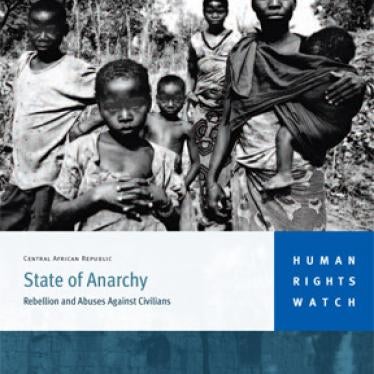(Paris)- Government troops, notably the elite Presidential Guard, have carried out hundreds of unlawful killings and burned thousands of civilian homes since mid-2005 in their counterinsurgency campaign in northern Central African Republic (CAR), a new report by Human Rights Watch charged.
The new 108-page report released today, "State of Anarchy: Rebellion and Abuses Against Civilians," is based on three weeks of on-the-ground research. It documents the human rights abuses and breaches of the laws of war committed in northern CAR by both rebel groups and the government forces, and also documents attacks by banditry groups in the northwest known as zaraguinas, who often kidnap children for ransom.
“Just across the border from Darfur, the army of the Central African Republic has killed hundreds of innocent civilians and forced tens of thousands to flee their villages,” said Peter Takirambudde, Africa director at Human Rights Watch. “The widespread burning of homes by government security forces is the signature abuse of the conflict.”
Since the beginning of the conflict in mid-2005, the CAR security forces have been responsible for the most serious violations in the conflict, including multiple summary executions and unlawful killings, widespread burning of civilian homes, and the forced displacement of hundreds of thousands of civilians. Human Rights Watch research determined that a single unit of the elite Presidential Guard, based in the town of Bossangoa, has been responsible for many of the killings and village burnings. Security forces often killed dozens of civilians in a single day, and some of the killings involved unspeakable brutality. On February 11, 2006, for instance, the Presidential Guard killed at least 30 civilians. The same Presidential Guard unit beheaded a teacher on March 22, 2006 in Bémal. Killings have continued up until last month, with soldiers robbing and killing four Chadian civilians and wounding four others, including two women, in the border town of Kabo in August 2007.
CAR army forces have also attacked and burned down hundreds of civilian villages in northern CAR, destroying an estimated 10,000 homes and creating a far-ranging humanitarian disaster. In one small area affected by the village burnings – the Batangafo-Kabo-Ouandago-Kaga Bandoro area – Human Rights Watch researchers counted a total of 2,923 burned homes, including more than 1,000 in the large market town of Ouandago alone. Similar destruction can be found throughout northwestern CAR, an area of hundreds of square kilometers.
According to the UN Office for the Coordination of Humanitarian Affairs, at least 102,000 civilians have been driven from their homes by attacks against their villages in the counterinsurgency.
Human Rights Watch said that not a single soldier or officer has been held accountable for the atrocities in CAR, and called on the CAR authorities to take immediate steps to end impunity and put in place effective civilian protection mechanisms in the north.
“The sorry fact is that the perpetrators of violence and abuse, the majority of them government soldiers, have so far enjoyed total impunity for acts that include war crimes,” said Takirambudde.
Rebel forces have also committed serious abuses, but not on a scale comparable to government forces. The Popular Army for the Restoration of the Republic and Democracy (APRD) rebels, consisting mostly of loyalists of the deposed president Félix Patassé and local self-defense formations, have engaged in widespread extortion and forced taxation, looting of livestock, kidnappings for ransom, beatings of civilians, and have been blamed for the killing of a civilian and an international humanitarian aid worker.
The Union of Democratic Forces for Unity (UFDR) rebels, a coalition of local Gula ethnic tribespeople and former rebels associated with current President Bozizé who have grown disenchanted with his rule, have also carried out serious abuses, including indiscriminate attacks on civilians, unlawful killings and summary executions, and massive looting of the civilian population. There have been allegations of rape by UFDR rebels, but Human Rights Watch was able to corroborate only a single such case. Both the APRD and UFDR have large numbers of child soldiers in their ranks, but are in discussions with UNICEF about the demobilization of these children.
Human Rights Watch further called on the United Nations and the European Union, who are currently considering deploying a civilian protection force to CAR and Chad, to ensure that the force has the mandate and the capacity to provide effective protection to civilians in CAR.
Human Rights Watch called on France, the former colonial power, which continues to provide military assistance to CAR and has deployed troops to help the government fight rebel forces, to speak out about the army abuses and demand accountability for these crimes.
“France, which is the CAR government’s key backer and has troops on the ground, could do much more to press the CAR authorities to stop the killings and the burnings,” said Takirambudde.







